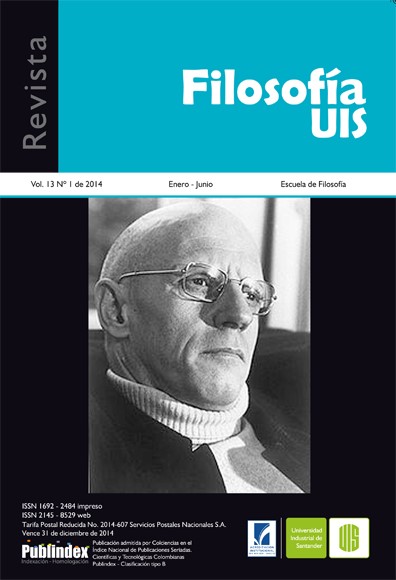Research Article
Civil disobedience as dissent. Thoreau, Arendt, Rawls
Published 2014-04-29
Keywords
- Rawls,
- Arendt,
- Thoreau,
- civil disobedience,
- citizenship
How to Cite
Ordóñez, E. J. (2014). Civil disobedience as dissent. Thoreau, Arendt, Rawls. Revista Filosofía UIS, 13(1), 123–137. Retrieved from https://revistas.uis.edu.co/index.php/revistafilosofiauis/article/view/4407
Copyright (c) 2014 Edward Javier Ordóñez

This work is licensed under a Creative Commons Attribution 4.0 International License.
Abstract
Civil disobedience is its cornerstone, at least as a concept, in the figure of Henry David Thoreau. This classical view is discussed both Arendt and Rawls, so that their own conceptual frameworks have (dis) similarities and improvements over the previous one. So, this article will show the most important thesis of civil disobedience in Thoreau, Arendt and Rawls, to reread as dissent, ie, in both societal model based on the discussion of injustice.
Downloads
Download data is not yet available.
References
- Arendt, H. (1999). “Desobediencia civil”. Crisis de la república. Madrid: Taurus.
- Aristóteles (2000). Ética a Nicómaco. Política. México: Porrúa.
- Casado da Rocha, A. (2004). Thoreau. Biografía esencial. Madrid: Acuarela.
- García, D. E. (2006). “La desobediencia civil como recurso de la sociedad civil para el alcance de la justicia”. Signos Filosóficos. Volumen VIII (15). pp. 25-64.
- Quintana, Ó. (2003). “La justificación constitucional de la desobediencia civil”. Revista de Estudios Sociales. (14). pp. 76-87.
- Rawls, J. (1995). Teoría de la justicia. México: Fondo de Cultura Económica.
- Thoreau, H. D. (1987). Desobediencia civil y otros textos. Madrid: Tecnos.
- Zalaquett, J. (2006). “La desobediencia civil en John Rawls y la ética de medidas de excepción y de medidas extremas”. Derecho y Humanidades. (12). pp. 121- 132.
